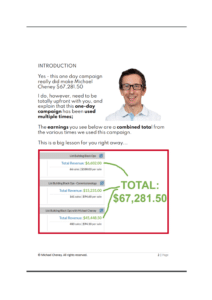Learn how to effectively use email marketing strategies to convert affiliate sales with tips on personalised communication, creating compelling content, and integrating affiliate links seamlessly.

Introduction to Email Marketing Strategies for Affiliate Sales Conversion
Email marketing is a cornerstone of successful affiliate marketing campaigns, playing a pivotal role in driving conversions and boosting sales. Through targeted and personalised email campaigns, affiliate marketers can establish direct communication channels with their audience, leading to higher engagement levels and increased conversion rates. The effectiveness of email marketing in influencing purchasing decisions and generating revenue for affiliate marketers is well documented, making it an indispensable tool in the affiliate marketing toolkit. By integrating email marketing strategies into their campaigns, affiliates can nurture customer relationships, build brand loyalty, and ultimately drive higher affiliate sales.
For example, consider a fashion affiliate marketer who sends out weekly newsletters featuring curated product recommendations and exclusive discounts to their subscribers. By tailoring the content to match subscriber preferences and purchasing patterns, the affiliate sees a significant uplift in both engagement metrics and sales conversions, showcasing the power of targeted email marketing campaigns.
Email marketing stands out in the affiliate marketing landscape for its ability to cultivate brand loyalty, retain customers, and encourage repeat purchases. The personalised nature of email communication fosters a sense of trust and credibility with subscribers, enhancing the overall customer experience and driving long-term value for affiliate marketers. Comparing the conversion rates of email marketing with other digital channels underscores the effectiveness of email campaigns in driving affiliate sales and revenue.
The Importance of Email Marketing in Affiliate Sales
Email marketing serves as a linchpin in the affiliate sales conversion process, offering affiliate marketers a direct line of communication with their audience to deliver tailored messages and promotions. By cultivating personalised relationships with subscribers, affiliates can create a loyal customer base that is more receptive to their offers and recommendations. The benefits of email marketing extend beyond immediate sales, encompassing brand loyalty, customer retention, and recurring revenue streams. Drawing a comparison between email marketing conversion rates and other digital marketing channels underscores the superior performance of email campaigns in driving affiliate sales and revenue.
To illustrate, consider an affiliate marketer in the technology niche who leverages email marketing to promote the latest gadgets and accessories. By segmenting their email list based on subscriber preferences and purchase history, the affiliate sends targeted product recommendations and exclusive deals, resulting in a higher conversion rate compared to generic marketing efforts on social media platforms.
Furthermore, email marketing enables affiliates to establish credibility and trust with their audience through consistent and valuable content delivery. By sharing industry insights, product reviews, and exclusive offers via email, affiliate marketers can position themselves as trusted advisors in their niche, fostering stronger relationships with their subscribers. The direct and personalised nature of email communication creates a unique opportunity for affiliates to engage with their audience on a deeper level, ultimately leading to increased brand loyalty and repeat sales.
 Strategies to Increase Conversion Rates in Affiliate Marketing
Strategies to Increase Conversion Rates in Affiliate Marketing
Effective email marketing campaigns are essential for maximising conversion rates in affiliate marketing. Crafting compelling subject lines and engaging email content is crucial to capturing the recipients’ attention and driving them to take action. Moreover, leveraging email automation tools allows affiliates to deliver targeted messages at optimal times, increasing the likelihood of conversions. Integrating social proof and customer testimonials into affiliate email campaigns can help build trust and credibility with subscribers, leading to higher conversion rates.
For instance, a health and wellness affiliate marketer can use customer testimonials in their email campaigns to showcase the effectiveness of a particular supplement or wellness product. By sharing real-life success stories and positive experiences, the affiliate can instill confidence in their audience and drive conversions effectively.
In addition to compelling content, optimising the design and layout of affiliate marketing emails is paramount to enhancing conversion rates. By incorporating visually appealing graphics, clear call-to-action buttons, and responsive design elements, affiliates can create a seamless user experience that encourages subscribers to engage with the email content and take the desired action. For example, a travel affiliate sending out a holiday promotion email can use vibrant images of exotic destinations and prominent CTA buttons to entice subscribers to book their next getaway, resulting in increased conversions.
Best Practices for Creating Effective Affiliate Marketing Emails
When creating affiliate marketing emails, adhering to best practices can significantly impact the success of your campaigns. Optimizing email content for mobile devices is essential to reaching a wider audience and delivering a seamless user experience. By ensuring that emails are mobile-responsive and visually appealing on smartphones and tablets, affiliates can engage with subscribers across various devices and increase the chances of conversions. For example, a food blogger promoting kitchen gadgets can design their emails with mobile users in mind, using concise and visually appealing content that is easily accessible on smaller screens.
Segmenting email lists based on user behaviour and preferences is another key strategy for creating effective affiliate marketing emails. By dividing subscribers into distinct segments and tailoring content to their interests, affiliates can deliver targeted messages that resonate with recipients and drive higher engagement levels. For instance, an affiliate marketer in the fitness industry can segment their email list based on workout preferences, sending personalised content and product recommendations to subscribers interested in specific types of exercise or fitness goals.
Incorporating interactive elements such as videos, polls, or quizzes in affiliate marketing emails can enhance engagement and encourage subscribers to take action. Interactive content not only captures the attention of recipients but also provides an immersive experience that can lead to higher conversion rates. For example, a lifestyle blogger partnering with fashion brands can include a video lookbook showcasing the latest trends or a quiz to help subscribers discover their personal style preferences, creating a more dynamic and engaging email campaign.
 Examples of Successful Affiliate Email Marketing Campaigns
Examples of Successful Affiliate Email Marketing Campaigns
Successful affiliate marketers have leveraged email marketing to drive significant results and boost their affiliate sales. By analysing specific email campaigns that have led to a substantial increase in conversions and commissions, affiliates can gain valuable insights into effective email marketing tactics. Comparing different types of affiliate email campaigns, such as product promotions and content newsletters, can provide a comprehensive understanding of what resonates with the target audience and drives successful outcomes.
For instance, an affiliate marketing professional promoting digital products could share a case study of a successful email campaign that resulted in a high conversion rate. By analysing the email content, subject line, and call-to-action elements that contributed to the campaign’s success, other affiliates can learn from the example and apply similar strategies to their own campaigns.
Moreover, exploring the impact of personalisation and segmentation in affiliate email campaigns can reveal how tailored messages and offers drive higher engagement and conversions. By showcasing examples of personalised emails that address specific subscriber needs or preferences, affiliate marketers can demonstrate the power of targeted communication in driving affiliate sales and revenue. For example, an affiliate promoting skincare products could share a successful email campaign that segmented subscribers based on skin type and recommended personalised product recommendations, resulting in a surge in sales and positive customer feedback.
Benefits of Email Marketing in Affiliate Campaigns
Email marketing offers a multitude of benefits for affiliate marketers seeking to maximise their sales and conversions. The direct line of communication it provides with the target audience allows affiliates to deliver personalised messages that resonate with subscribers on an individual level. This personalisation leads to higher engagement rates, increased brand loyalty, and ultimately, improved conversion rates. For example, a tech affiliate marketer can send targeted emails to subscribers based on their previous purchases or browsing behaviour, recommending relevant products and nurturing long-term relationships effectively.
Furthermore, email marketing facilitates the building of brand credibility and trust with subscribers. By consistently delivering valuable content and offers, affiliate marketers can establish themselves as authorities in their niche, fostering a sense of reliability and dependability among their audience. This trust is crucial for driving conversions, as subscribers are more likely to make a purchase from a brand they trust. For example, an affiliate marketing professional promoting eco-friendly products can share educational content on sustainability practices, positioning themselves as a trustworthy source and increasing the likelihood of conversions among environmentally conscious subscribers.
Additionally, email marketing allows for the promotion of new products or services directly to the target audience. Affiliate marketers can leverage their email lists to introduce and showcase the latest offerings, generating interest and driving sales. For instance, a fashion affiliate could send out an exclusive preview of a new clothing line to their subscribers, creating a sense of exclusivity and prompting immediate action. This direct and targeted approach to product promotion often results in higher conversion rates compared to broader marketing strategies, making email marketing a valuable tool in an affiliate marketer’s arsenal.
 Targeting and Segmentation in Email Marketing
Targeting and Segmentation in Email Marketing
Targeting and segmentation play a vital role in the success of email marketing campaigns for affiliate sales conversion. By creating detailed buyer personas, affiliate marketers can tailor their email content to specific audience segments, increasing the relevance and effectiveness of their campaigns. For instance, a beauty affiliate marketer can segment their email list based on subscriber preferences for skincare products, sending targeted emails with relevant product recommendations and promotions to each segment. This personalised approach enhances the customer experience and drives higher engagement and conversions.
Moreover, utilising behavioural data and demographics enables affiliate marketers to send highly targeted emails that resonate with the unique needs and preferences of their subscribers. For example, an affiliate promoting fitness equipment can segment their email list based on workout preferences or fitness goals, delivering personalised content and offers that cater to each subscriber’s interests. This targeted strategy not only increases the likelihood of conversions but also strengthens customer relationships and loyalty. Additionally, incorporating dynamic content in emails ensures that subscribers receive content that adapts based on their interactions and preferences, enhancing engagement and driving conversions. This dynamic content can include personalised product recommendations, tailored promotions, or interactive elements that encourage subscriber interaction, resulting in a more engaging and effective email campaign.
Do’s and Don’ts of Affiliate Email Marketing
In affiliate email marketing, following best practices is essential for the success of your campaigns and the overall effectiveness of your affiliate sales conversion strategies. One crucial “do” is including genuine product experiences in your emails to build trust and credibility with your audience. By sharing authentic reviews and testimonials from satisfied customers, you can showcase the value and benefits of the products or services you are promoting, increasing the likelihood of conversions. For example, an affiliate marketer in the wellness industry can feature testimonials from customers who have experienced positive results from using a particular health supplement, demonstrating the product’s efficacy and encouraging subscribers to make a purchase.
Another important practice is ensuring that your email campaigns are relevant to your audience by segmenting your email list based on subscriber preferences and behaviour. By sending targeted messages that align with subscriber interests and needs, you can increase engagement and drive conversions. For instance, if you have a segment of subscribers interested in healthy cooking, you can tailor your emails to include recipes, cooking tips, and product recommendations related to this topic, creating a more personalised and engaging experience for your audience.
On the flip side, there are certain “don’ts” that affiliate marketers should avoid in their email marketing efforts. One common mistake is bombarding subscribers with irrelevant content or excessive promotional emails, which can lead to email fatigue and higher unsubscribe rates. Instead, focus on delivering valuable and engaging content that adds value to your subscribers’ inboxes. Additionally, it’s essential to steer clear of using spammy language or deceptive tactics in your emails, as this can damage your brand reputation and lead to higher spam complaints. By following these best practices and avoiding common pitfalls, you can enhance the effectiveness of your affiliate email marketing campaigns and build stronger relationships with your audience.
Tracking and Measuring Success of Email Campaigns
Tracking and measuring the success of your email campaigns is crucial for evaluating performance, identifying areas for improvement, and refining your strategies for better results. Key email marketing metrics, such as open rates, click-through rates, and conversion rates, provide valuable insights into the effectiveness of your campaigns. For example, by analysing the open rates of your emails, you can gauge the impact of your subject lines and the overall engagement of your subscribers. Similarly, monitoring click-through rates helps you understand how well your email content resonates with your audience and drives action.
Furthermore, comparing different email marketing platforms and tools can help you choose the right solution for tracking and analysing your campaign performance. Platforms that offer robust analytics and reporting capabilities can provide in-depth insights into subscriber behaviour, campaign effectiveness, and ROI. By leveraging A/B testing, you can experiment with different elements of your emails, such as subject lines, content variations, or CTAs, to determine the most effective strategies for driving conversions. This data-driven approach allows you to make informed decisions based on real-time results and continuously refine your email marketing tactics for optimal performance.
Launching Your Affiliate Email Marketing Campaign
When launching an affiliate email marketing campaign, it’s essential to start with a clear plan and defined objectives to guide your strategy and content creation. Setting specific goals, such as increasing affiliate sales, driving website traffic, or promoting new products, helps you tailor your email campaigns to achieve the desired outcomes. For instance, if your goal is to boost affiliate sales for a particular product line, you can design email sequences that highlight the features, benefits, and promotions of those products to encourage purchases.
Selecting a reliable email service provider (ESP) that meets your needs and offers essential features is crucial for the success of your affiliate email marketing campaigns. Popular ESPs such as Mailchimp, ConvertKit, or Constant Contact provide user-friendly interfaces, automation tools, and detailed analytics to help you create, send, and track your email campaigns effectively. By choosing an ESP that aligns with your campaign goals and audience needs, you can streamline your email marketing efforts and maximise the impact of your affiliate sales conversion strategies.
 Conclusion: Implementing Effective Email Marketing Strategies for Affiliate Sales Conversion
Conclusion: Implementing Effective Email Marketing Strategies for Affiliate Sales Conversion
In conclusion, implementing effective email marketing strategies is essential for maximising conversion rates and driving affiliate sales in the competitive digital landscape. By leveraging targeted communication, personalisation, and segmentation in email campaigns, affiliate marketers can engage with their audience on a deeper level, leading to higher conversion rates and increased revenue. For example, a successful affiliate email marketing campaign by a lifestyle blogger could involve sending personalised product recommendations based on subscriber preferences, resulting in a significant uplift in affiliate sales.
Tracking and measuring the success of email campaigns through key metrics and analytics is critical for refining strategies and achieving optimal results over time. By analysing performance data, conducting A/B testing, and making data-driven decisions, affiliate marketers can continuously improve their email marketing tactics and drive sustainable growth in their affiliate sales. For instance, an affiliate marketer promoting eco-friendly products could test different email content variations to identify the most effective messaging for driving conversions. By staying informed, experimenting with new approaches, and adapting to changing trends, affiliate marketers can enhance their email marketing efforts and achieve greater success in converting affiliate sales.

If you’ve been struggling online, this report will open your eyes.

Become the Internet Marketing Millionaire’s Next Apprentice!!

 Strategies to Increase Conversion Rates in Affiliate Marketing
Strategies to Increase Conversion Rates in Affiliate Marketing Examples of Successful Affiliate Email Marketing Campaigns
Examples of Successful Affiliate Email Marketing Campaigns Targeting and Segmentation in Email Marketing
Targeting and Segmentation in Email Marketing Conclusion: Implementing Effective Email Marketing Strategies for Affiliate Sales Conversion
Conclusion: Implementing Effective Email Marketing Strategies for Affiliate Sales Conversion